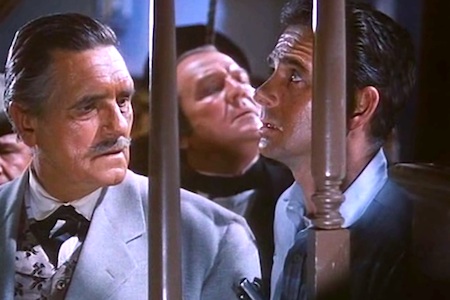Scene from SILVER LODE.
“Who amongst us is without a blot on his escutcheon?”, a wild west mouthpiece waxes rhetorically in old school Hollywood veteran Allan Dwan’s delirious Red Scare western Silver Lode—a film from which, pinko to its core, no “hero” emerges unbesmirched. Made in the wake of the second HUAC investigations into Communism in Hollywood, at the height of the industry Blacklist, and released in 1954, during the year of the Army-McCarthy hearings, Silver Lode may, on its surface, be specifically about the wrongful placing of blame. But it’s what lurks beneath the surface of this hopped-up cash-in on High Noon’s claims to zeitgeist zing that matters: Once it’s all over, everyone shares in the shame.
It’s the Fourth of July and granite-jawed leading man John Payne is about to marry Lizabeth Scott, the richest, prettiest girl in town. Kids are playing in the street with firecrackers (“Look out, it’s gonna explode!”) while Temperance League spinsters serve cold glasses of branch water to passersby. This wholesome American goodness is suddenly interrupted by the hooves and jingles of a quartet of black-clad riders, lead by one of the greatest interpreters of grinning evil in the history of the medium, the blonde ultra-bastard Dan Duryea. They want Payne.
Back in California, claims Duryea (a desperado now posing as a U.S. Marshall named, wait for it: “McCarty”), Payne shot Duryea’s brother in the back and stole his money. The townsfolk, who’ve only known relative-newcomer Payne a couple of years, want to stand by this square-headed young man, but—what with the telegraph wires being wonky over the holiday weekend, and no way to confirm “McCarty’s” credentials or imputations—suspicion seeps slowly in among them all. And before you can say “witch hunt,” Payne is dodging a lynch mob while the American way comes as easily unraveled as a poorly knit sock. Finally, it’s down to Payne’s bride-to-be and his former hook-up, a hooker in a hot purple dress—played with a surfeit of sneers by producer Benedict Bogeaus’ wife, Dolores Moran—to use their respective good-wife bluster and bargirl wiles to blackmail justice back into effect.
Critic-turned-filmmaker Peter Bogdanovich asked Dwan, late in his life, if Bogeaus or any of his other producers of the period had known he was secretly making comedies out of the scripts they considered serious works of dramatic art. “They still don’t!” snorted Dwan.
In this climactic scene, Duryea has corned Payne in the bell tower of the local church, high atop a rough-hewn set of shadow-latticed Vertigo stairs, with only an enormous (Liberty?) bell separating good from evil. (On the bell, the date 1867: the year the first volume of Das Kapital was published.) The men of the town wait, frozen in self-righteousness and cowardice, in the chapel down below. Frantically, Payne’s betrothed and former bargirl rush in with what purports to be a telegram indicting “McCarty” and exonerating Payne. Duryea shoots, the bell intercedes: ricochet destiny. Justice is done, a sermon is delivered, and the clip concludes….but wait! Watch this remarkable film in its entirely and you’ll learn that in fact, that telegram was a fake. The info the missive claimed to contain was true all right, but Scott and Moran, unable to get through by telegraph to California, forged it in order to save Payne in time. Why, they’re as guilty as Joseph McCarthy…I mean, Duryea’s “McCarty!” This is a star-spangled Fourth of July America where no one tells the truth!
Dwan, one of the oldest of Hollywood old timers (he’d come up as a contemporary of D.W. Griffith during the Silents, directed hundreds of films, and invented countless pioneering camera-gadgets and cine-gizmos along the way), thought of Silver Lode (one of several tightly-wound quickies he’d make for producer Benedict Bogeaus in the ’50s) not as the relatively classical western we might mistake it for today, but rather as a tongue-deeply-in-cheek satire of the form…even if only the most astute contemporary critics of the genre would have recognized it as such. One of them, critic-turned-filmmaker Peter Bogdanovich asked Dwan, late in his life, if Bogeaus or any of his other producers of the period had known he was secretly making comedies out of the scripts they considered serious works of dramatic art. “They still don’t!” snorted Dwan.




